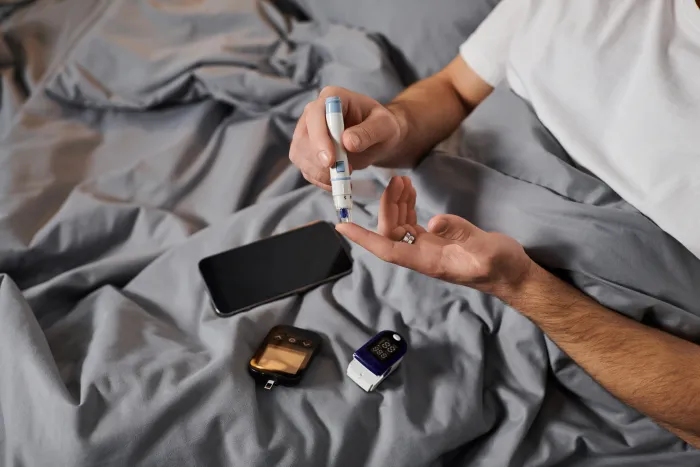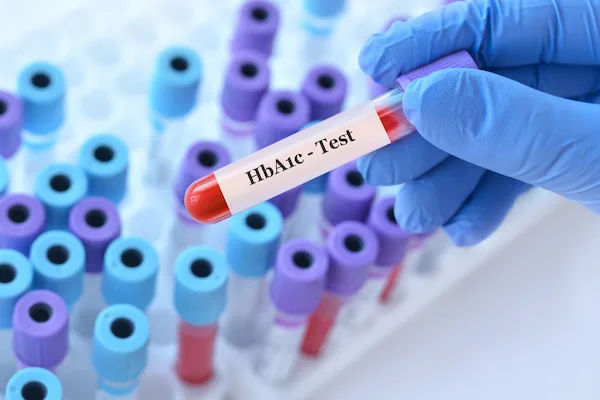Does Saccharin Affect Blood Sugar Levels?
Wondering if saccharin raises blood sugar? Learn how this artificial sweetener affects glucose levels, its safety for diabetics, potential side effects, and smart usage tips.

Written by Dr. Siri Nallapu
Reviewed by Dr. Dhankecha Mayank Dineshbhai MBBS
Last updated on 13th Jan, 2026

Introduction
If you're managing diabetes or simply watching your sugar intake, you may have heard about saccharin—a popular artificial sweetener. But does saccharin affect blood sugar levels? Let’s explore this topic in a simple, friendly way so you can make informed choices for your health.
What is Saccharin?
Saccharin is one of the oldest artificial sweeteners, discovered over a century ago. It’s about 300–400 times sweeter than regular sugar (sucrose), which means you only need a tiny amount to get the same sweetness. Because it has zero calories and no carbohydrates, it was initially considered a great sugar substitute for people with diabetes or those trying to lose weight.
You’ll find saccharin in:
Diet sodas
Sugar-free candies and gums
Tabletop sweeteners (e.g., Sweet'N Low)
Some medicines and toothpaste
Does Saccharin Raise Blood Sugar?
The short answer is no, saccharin does not directly raise blood sugar levels because it contains no carbohydrates or calories. However, research suggests that artificial sweeteners like saccharin may have indirect effects on blood sugar and metabolism.
What Does Science Say?
1. No Immediate Spike in Blood Sugar – Since saccharin isn’t broken down by the body, it doesn’t cause a rapid rise in glucose levels like regular sugar does. This makes it a safer option for people with diabetes when used in moderation.
2. Possible Gut Bacteria Impact – Some studies suggest that artificial sweeteners, including saccharin, might alter gut bacteria in a way that could affect glucose metabolism over time. However, more research is needed to confirm this effect in humans.
3. Sweet Taste & Insulin Response – There’s a theory that the sweet taste of saccharin might trigger the brain to expect sugar, leading to a slight insulin release. But this effect is minor and doesn’t significantly impact blood sugar levels.
Is Saccharin Safe for Diabetics?
For most people with diabetes, saccharin is considered safe in moderate amounts. The American Diabetes Association (ADA) states that non-nutritive sweeteners like saccharin can be a useful tool for reducing sugar intake.
However, if you notice any unusual changes in blood sugar levels after consuming saccharin, it’s best to monitor your response and consult your doctor.
Potential Side Effects
While saccharin is approved by the FDA, some people may experience:
A bitter aftertaste (common with artificial sweeteners)
Digestive issues (bloating or nausea in rare cases)
Allergic reactions (very uncommon)
In the past, saccharin was linked to bladder cancer in rats, but further studies showed this does not apply to humans. It has been removed from the list of potential carcinogens.
Tips for Using Saccharin Wisely
If you choose to use saccharin, here are some helpful tips:
Use in moderation – While safe, excessive intake isn’t recommended.
Combine with natural sweeteners – Try mixing with stevia or monk fruit for better taste.
Monitor your body’s response – Check if it affects your cravings or glucose levels.
Stay hydrated – Some artificial sweeteners can increase thirst
Consult Top Specialists for Personalised Tips
Healthier Alternatives to Saccharin
If you’re looking for other sugar substitutes, consider:
Stevia (plant-based, no calories)
Monk fruit extract (natural, zero glycemic impact)
Erythritol (sugar alcohol, minimal effect on blood sugar)
When to See a Doctor
If you have diabetes and are unsure about sweeteners, or if you experience unexpected blood sugar changes, it’s best to consult a healthcare provider. You can easily book a diabetes consultation or blood sugar test through Apollo 24|7 for personalized advice.
Conclusion
Saccharin does not directly raise blood sugar levels, making it a viable sugar substitute for diabetics when used wisely. However, long-term effects on gut health and metabolism are still being studied. The key is moderation and paying attention to how your body reacts.
If you’re managing diabetes, always consult your doctor before making significant dietary changes.
Consult Top Specialists
Consult Top Specialists for Personalised Tips

Dr. Hariprasath J
General Physician/ Internal Medicine Specialist
19 Years • MD (Gen Med), FCCP, Dip (Diabetology, UK)
Chennai
Apollo First Med Hospitals P H Road, Chennai
(225+ Patients)

Dr Vinay Kumar A V
Nephrologist
8 Years • MBBS, MD - General Medicine, DM - Nephrology
Bilaspur
Apollo Hospitals Seepat Road, Bilaspur

Dr. Utsa Basu
Diabetologist
14 Years • MBBS , MD
Barasat
Diab-Eat-Ease, Barasat
(75+ Patients)

Dr. Vivek D
General Physician
4 Years • MBBS
Bengaluru
PRESTIGE SHANTHINIKETAN - SOCIETY CLINIC, Bengaluru

Dr Tushar Karmakar
General Physician/ Internal Medicine Specialist
7 Years • MBBS, MD General Medicine
Kolkata
Kare pharmacy, Kolkata
Consult Top Specialists

Dr. Hariprasath J
General Physician/ Internal Medicine Specialist
19 Years • MD (Gen Med), FCCP, Dip (Diabetology, UK)
Chennai
Apollo First Med Hospitals P H Road, Chennai
(225+ Patients)

Dr Vinay Kumar A V
Nephrologist
8 Years • MBBS, MD - General Medicine, DM - Nephrology
Bilaspur
Apollo Hospitals Seepat Road, Bilaspur

Dr. Utsa Basu
Diabetologist
14 Years • MBBS , MD
Barasat
Diab-Eat-Ease, Barasat
(75+ Patients)

Dr. Vivek D
General Physician
4 Years • MBBS
Bengaluru
PRESTIGE SHANTHINIKETAN - SOCIETY CLINIC, Bengaluru

Dr Tushar Karmakar
General Physician/ Internal Medicine Specialist
7 Years • MBBS, MD General Medicine
Kolkata
Kare pharmacy, Kolkata

